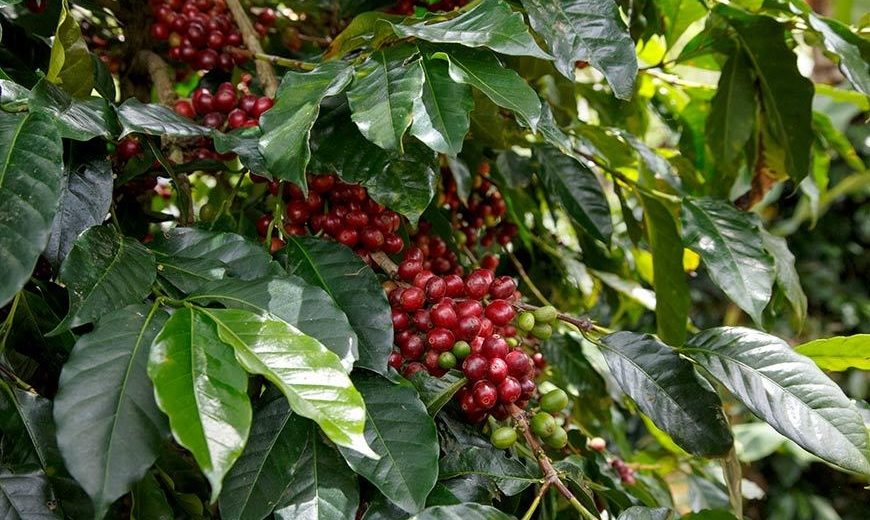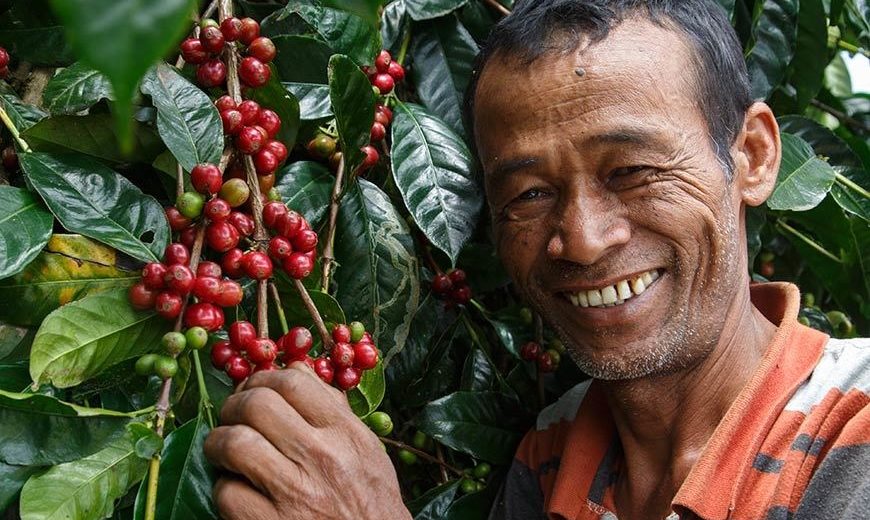Details
Country: Indonesia
Founded: 1995
Fairtrade certified in: 2007
Main products:
Coffee
Number of members: 7,824 members.
Some of the best coffee in the world is grown on the steep wooded slopes of Central Aceh’s highland in Northern Sumatra. The tropical climate, fertile soils and high altitudes of this mountainous region provide the perfect conditions for Arabica coffee.
This is where Fairtrade coffee farmers of Koperasi Baitul Qiradh Baburrayyan (KBQB) founded their coffee business in 1995.
Details
Country: Indonesia
Founded: 1995
Fairtrade certified in: 2007
Main products:
Coffee
Number of members: 7,824 members.

The coffee trees, introduced to Indonesia by Dutch colonists in the 17th century, are grown in small family-owned gardens that average one hectare in size. Coffee farming is the main source of livelihood in the area, with around 90 percent of people directly or indirectly dependent on coffee.
The Fairtrade coffee farmers of Koperasi Baitul Qiradh Baburrayyan (KBQB), located in Takengon and Bener Meriah, founded their coffee business in 1995.
Comprising 106 villages across two districts, the cooperative and all its facilities are owned by the 7,824 farmer members.
The farmers of KBQB understand that there are many factors that contribute to a delicious cup of coffee, but they have learned through experience that it all begins with the earth that supports their coffee bushes.
KBQB’s experience and professionalism have ensured long-term trading partnerships in the US, Australian and European market. Certified since early 2007, they are selling 100 percent of their green coffee – unroasted beans that have been processed ready for export – as Fairtrade. This makes them one of the most influential co-ops in the area, setting the local reference price in Takengon, and in Fairtrade as well.
Not only does the co-op adhere to the Fairtrade standards of economic fairness, democratic participation, and transparency. KBQB’s coffee is also produced in an environmentally sustainable way; all coffee is 100 percent organic.
Farmers are trained on a regular basis and have to comply with all Fairtrade and organic standards to maintain their membership.

40-year-old Mr. Sobur is a coffee farmer like his father and grandfather. Before he joined the KBQB co-op in 2005, he applied herbicides to the coffee bushes on his plot.
“At the time, everyone tried it. We didn’t know about the effects of using herbicides. It is a poison. It killed the weed but the coffee trees were also affected; taste and aroma of our coffee changed. Then our chicken died, because they were picking the coffee cherries. We then realised it was affecting our health too,” said Sobur.
“We used to do coffee farming traditionally, like our forefathers, but now we have become professionals. The cooperative taught us how to do organic farming based on knowledge and skills. This knowledge helps us increase our productivity and quality.”
Farmers discovered that using herbicides not only destroys weed in the coffee gardens, but also eradicates vital microorganisms, worms and insects in the soil. Herbicide use weakens plant roots and immune systems; and reduces concentrations of essential plant nutrients in the soil such as nitrogen and phosphorous. In the long run it kills the soil, ruins the quality of coffee and reduces the yield of the tree.
Mr. Syairun, 43 and Mr. Sukri, 42 years old, are coffee farmers on neighbouring one hectare plots. “When we joined KBQB, we learned how to prune properly; regular weeding is also very important. Now it is less costly than with chemical fertilizers and we have doubled our productivity. With organic compost, the coffee grows slowly but has a better quality.”
But when Sukri’s brother helped out in the coffee garden one day in 2008, a catastrophe happened. The brother sprayed herbicides without Sukri knowing it. Both neighbours were immediately suspended from membership of the co-op for three years and could only sell their production as conventional coffee to local traders.
“It was very bad, I was so angry with my brother” Sukri says. “And my friend Syairun was affected too. We couldn’t sell our coffee to the cooperative, lost all the Premium benefits and had to wait for three years. Now we protect each other, so we don’t get into trouble.”
“We are teaching the farmers that weeds are not the enemy of the coffee tree” says Sahmida, coordinator of KBQB’s Environment Programme. Aided by the Internal Control System (ICS) staff, Sahmida is responsible for the implementation and monitoring of environmental standards.
KBQB have used Fairtrade Premium funds to buy grass trimmers to facilitate weeding, and farmers have learned how to produce their own organic fertilizer from weeds, tree branches and cherry pulp.
“Weeds have a lot of functions if managed well. They are essential for strong soil and a healthy coffee garden, weeds provide organic fertilizer. They also prevent erosion and the depletion of soil nutrition; a ‘clean’ soil is prone to landslides.”
In recent years, the Central Aceh highlands have been harshly affected by climate change. Since it has been getting warmer, diseases and pests are spreading into higher regions. Weather has become unpredictable with rains getting much heavier. Takengon’s steep slopes have become subject to severe water erosion causing devastating landslides, which make immediate conservation practices necessary. KBQB has invested Fairtrade Premium funds to advance the variety of shade trees for the coffee gardens in a broad research project, nursery and renaturation pilot.
With their deep roots rooted in rich soils, indigenous varieties of shade trees help prevent landslides. They protect the coffee plants, decrease pests and improve the micro-climate. The new trees are also drought resistant, use less water and grow much faster and thicker than the old varieties. In the past years KBQB have planted 25,000 trees, and are heading for another 40,000.
“Coffee is our life. If our coffee trees are gone, our lives are gone” Sukri says. This is why KBQB have set their priority in sustainable organic farming; the future of 5,500 coffee producers depends on it.”
This story was first added to our website on 15 December 2015.